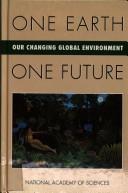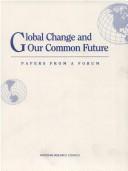| Listing 1 - 10 of 11 | << page >> |
Sort by
|
Book
ISBN: 9780465044979 0465044972 Year: 2014 Publisher: New York (N.Y.): Basic books,
Abstract | Keywords | Export | Availability | Bookmark
 Loading...
Loading...Choose an application
- Reference Manager
- EndNote
- RefWorks (Direct export to RefWorks)
"Our species' pervasive presence on the planet is the combined result of two powerful forces: earth's rich natural endowments and humanity's ability to manipulate nature. From our ability to control fire to our expertise in breeding palatable plants, from our capacity to ship fertilizer across the Atlantic to our skill in selectively tinkering with plant genomes, DeFries describes the ingenious manipulations of nature that have enabled humankind to nourish and flourish. Throughout history humans have been able to ratchet up populations, survive the hatchets that threaten the species, and pivot to a new strategy for survival"--
Nature --- Human ecology --- Physical anthropology --- Human evolution --- Social evolution --- Survival --- Survival after airplane accidents, shipwrecks, etc. --- Survival skills --- Cultural evolution --- Cultural transformation --- Culture, Evolution of --- Culture --- Evolution --- Social change --- Evolution (Biology) --- Evolutionary psychology --- Human beings --- Biological anthropology --- Somatology --- Anthropology --- Human biology --- Ecology --- Environment, Human --- Human environment --- Ecological engineering --- Human geography --- Anthropogenic effects on nature --- Ecological footprint --- Anthropogenic soils --- Effect of human beings on --- Origin --- Social aspects --- Effect of environment on --- Nature - Effect of human beings on
Book
Year: 1986 Publisher: Washington (D.C.): US. Government printing office
Abstract | Keywords | Export | Availability | Bookmark
 Loading...
Loading...Choose an application
- Reference Manager
- EndNote
- RefWorks (Direct export to RefWorks)
Book
ISBN: 0231553102 Year: 2021 Publisher: New York : Columbia University Press,
Abstract | Keywords | Export | Availability | Bookmark
 Loading...
Loading...Choose an application
- Reference Manager
- EndNote
- RefWorks (Direct export to RefWorks)
Not long ago, the future seemed predictable. Now, certainty about the course of civilization has given way to fear and doubt. Raging fires, ravaging storms, political upheavals, financial collapse, and deadly pandemics lie ahead—or are already here. The world feels less comprehensible and more dangerous, and no one, from individuals to businesses and governments, knows how to navigate the path forward.Ruth DeFries argues that a surprising set of time-tested strategies from the natural world can help humanity weather these crises. Through trial and error over the eons, life has evolved astonishing and counterintuitive tricks in order to survive. DeFries details how a handful of fundamental strategies—investments in diversity, redundancy over efficiency, self-correcting feedbacks, and decisions based on bottom-up knowledge—enable life to persist through unpredictable, sudden shocks. Lessons for supply chains from a leaf’s intricate network of veins and stock market-saving “circuit breakers” patterned on planetary cycles reveal the power of these approaches for modern times. With humility and willingness to apply nature’s experience to our human-constructed world, DeFries demonstrates, we can withstand uncertain and perilous times. Exploring the lessons that life on Earth can teach us about coping with complexity, What Would Nature Do? offers timely options for civilization to reorganize for a safe and prosperous future.
Book
Year: 1986 Publisher: Washington U. S. Geological Survey
Abstract | Keywords | Export | Availability | Bookmark
 Loading...
Loading...Choose an application
- Reference Manager
- EndNote
- RefWorks (Direct export to RefWorks)
Book
ISBN: 9780231553100 0231553102 9780231199421 0231199422 Year: 2021 Publisher: New York : Columbia University Press,
Abstract | Keywords | Export | Availability | Bookmark
 Loading...
Loading...Choose an application
- Reference Manager
- EndNote
- RefWorks (Direct export to RefWorks)
Not long ago, the future seemed predictable. Now, certainty about the course of civilization has given way to fear and doubt. Raging fires, ravaging storms, political upheavals, financial collapse, and deadly pandemics lie ahead—or are already here. The world feels less comprehensible and more dangerous, and no one, from individuals to businesses and governments, knows how to navigate the path forward.Ruth DeFries argues that a surprising set of time-tested strategies from the natural world can help humanity weather these crises. Through trial and error over the eons, life has evolved astonishing and counterintuitive tricks in order to survive. DeFries details how a handful of fundamental strategies—investments in diversity, redundancy over efficiency, self-correcting feedbacks, and decisions based on bottom-up knowledge—enable life to persist through unpredictable, sudden shocks. Lessons for supply chains from a leaf’s intricate network of veins and stock market-saving “circuit breakers” patterned on planetary cycles reveal the power of these approaches for modern times. With humility and willingness to apply nature’s experience to our human-constructed world, DeFries demonstrates, we can withstand uncertain and perilous times. Exploring the lessons that life on Earth can teach us about coping with complexity, What Would Nature Do? offers timely options for civilization to reorganize for a safe and prosperous future.
Resilience (Ecology) --- Sustainability. --- Uncertainty. --- Human ecology. --- Résilience (écologie) --- Durabilité (écologie) --- Incertitude --- Écologie humaine --- Résilience (écologie) --- Durabilité (écologie) --- Écologie humaine --- Sustainability --- Uncertainty --- Human ecology

ISBN: 0309041414 9780309041416 Year: 1990 Publisher: Washington (D.C.): National academy press,
Abstract | Keywords | Export | Availability | Bookmark
 Loading...
Loading...Choose an application
- Reference Manager
- EndNote
- RefWorks (Direct export to RefWorks)
Nature --- Pollution. --- Global warming. --- Environmental policy --- Effect of human beings on. --- Global warming --- -Chemical pollution --- Chemicals --- Contamination of environment --- Environmental pollution --- Pollution --- Contamination (Technology) --- Asbestos abatement --- Bioremediation --- Environmental engineering --- Environmental quality --- Factory and trade waste --- Hazardous waste site remediation --- Hazardous wastes --- In situ remediation --- Lead abatement --- Pollutants --- Refuse and refuse disposal --- Warming, Global --- Global temperature changes --- Greenhouse effect, Atmospheric --- Environment and state --- Environmental control --- Environmental management --- Environmental protection --- State and environment --- Environmental auditing --- Effect of human beings on --- Environmental aspects --- Control --- Government policy --- Environmental policy. --- -Global warming --- Chemical pollution --- -Effect of human beings on --- Anthropogenic effects on nature --- Ecological footprint --- Human beings --- Anthropogenic soils --- Human ecology --- Nature - Effect of human beings on
Book
ISBN: 2869850484 Year: 1992 Publisher: Paris Sang de la terre
Abstract | Keywords | Export | Availability | Bookmark
 Loading...
Loading...Choose an application
- Reference Manager
- EndNote
- RefWorks (Direct export to RefWorks)
Publié avec succès aux Etats-Unis, sous l'autorité d'une des plus hautes instances scientifiques américaines, ce livre de synthèse très clair et didactique est un véritable manuel à l'usage du grand public sur les principaux bouleversements en cours dans notre environnement planétaire. Réchauffement du climat, diminution de la couche d'ozone, déforestation, disparition de nombreuses espèces, épuisement des sols, ... ne sont plus des phénomènes régionaux. Ils menacent l'équilibre global du système terrestre dont les perturbations s'accélèrent avec l'accroissement de la population. Sans prétendre nous assurer totalement contre le risque écologique, il est encore temps de réduire les menaces. La communauté scientifique confirme aujourd'hui ce que crient les écologistes depuis de nombreuses années : nous n'avons qu'une seule planète et notre avenir est commun.
Aarde--Opwarming --- Algemene opwarming van de aarde --- Chemical pollution --- Contamination of environment --- Environment and state --- Environmental control --- Environmental management (Government policy) --- Environmental policy --- Environmental pollution --- Environnement [Politique de l'] --- Global warming --- Milieubeleid --- Opwarming [Algemene ] van de aarde --- Politique de l'environnement --- Pollution --- Pollution--Control --- Pollution--Prevention --- Réchauffement global --- State and environment --- Verontreiniging --- Vervuiling --- Aarde -- Opwarming --- Aquecimento global --- Climat -- Réchauffement --- Globale Erwärmung --- Klimaatopwarming --- Opwarming van de Aarde --- Réchauffement climatique --- Réchauffement de la Terre --- Réchauffement planétaire --- Terre -- Réchauffement --- Human beings --- Influence on nature
Book
Year: 1992 Publisher: Paris: Sang de la terre,
Abstract | Keywords | Export | Availability | Bookmark
 Loading...
Loading...Choose an application
- Reference Manager
- EndNote
- RefWorks (Direct export to RefWorks)
Book
ISBN: 0875904181 9780875904184 Year: 2004 Publisher: Washington, DC: American geophysical union,
Abstract | Keywords | Export | Availability | Bookmark
 Loading...
Loading...Choose an application
- Reference Manager
- EndNote
- RefWorks (Direct export to RefWorks)

ISBN: 0309040892 9786610214266 1280214260 0309543142 058514902X 9780585149028 9780309040891 Year: 1989 Publisher: Washington, D.C. : National Academy Press,
Abstract | Keywords | Export | Availability | Bookmark
 Loading...
Loading...Choose an application
- Reference Manager
- EndNote
- RefWorks (Direct export to RefWorks)
The Forum on Global Change and Our Common Future was organized to inform the public about the changes occurring in the global environment and the implications for public policy. This title includes 22 edited presentations from the Forum.
Civilisation --- Human ecology. Social biology --- Environmental policy --- Global warming --- Human ecology --- Pollution --- Congresses. --- Environmental aspects --- Chemical pollution --- Chemicals --- Contamination of environment --- Environmental pollution --- Contamination (Technology) --- Asbestos abatement --- Bioremediation --- Environmental engineering --- Environmental quality --- Factory and trade waste --- Hazardous waste site remediation --- Hazardous wastes --- In situ remediation --- Lead abatement --- Pollutants --- Refuse and refuse disposal
| Listing 1 - 10 of 11 | << page >> |
Sort by
|

 Search
Search Feedback
Feedback About UniCat
About UniCat  Help
Help News
News